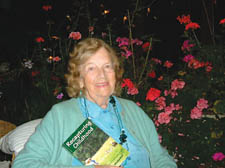|
|
 |
| |

Author Mildred Masheder |
Lost in the system: my two weeks in hospital
Five ward moves in a fortnight’s stay at the
Royal Free put Mildred Masheder beyond the reach of friends – and even of medical staff
BEFORE anything else, let me pay tribute to the staff at the Royal Free Hospital, in Hampstead.
From nurses to cleaners, consultants to doctors, they are doing a fantastic job, in spite of the many frustrations and their heavy workload.
I am writing about my frustrating experiences during two weeks and I gather from other sources that they are not at all unique.
It began with my admission: there was no knowledge of my arrival at the reception area – although it had been scheduled.
My carer was lucky enough to get a wheelchair; I didn’t know at that stage that they were like gold dust!
We went from pillar to post until my details were unearthed and I was put on a bed in a small, bare white room where I had to wait with no means of communication with the outside world.
I waited from midday until 6pm when I called out “I’m going to die of starvation!” A voice only somewhat reassured me: “Don’t worry,” it said. “You’re only allowed to be in the waiting room for up to four hours!”
I counted. But the cry from my stomach and my throat finally registered and after waiting for a porter, I was wheeled up to the medical admissions assessment unit.
Altogether I was in five different wards during my stay and this constant movement not only caused me physical and mental distress, but also resulted in complete ignorance as to where I could be traced.
The most traumatic was the last move. At 10.30pm I was told I was to be moved and the nurse came with two bin bags to load up, higgledy-piggledy, all my possessions.
I was then wheeled out in to the corridor and had to wait for three hours for a porter – to be finally settled in my next ward at 2am.
Three hours to wait for a porter seemed fairly standard, but somehow it seemed longer in the middle of the night with, of course, the usual wait for the lift. When I asked if it was an emergency, the nurse replied “No,” and then gave the usual “reassurance” to a 91-year-old: “Don’t worry.”
But there was worry; no one could find me. The physiotherapist had already given up and even the weekend duty doctor said he had spent two days looking before he found me!
It is no wonder that visitors couldn’t trace me. In fact one, who had to come a long way, gave up.
One move was at my own request because of a difficulty with a neighbouring patient. I mention this to pay tribute to PALS, an organisation that deals confidentially with patients’ problems who efficiently organised the move.
The nurses were all part of the communication deficit, recently deplored in the local press. This becomes a much more urgent problem when dealing both with medical and organisational matters.
I do realise that it is sometimes necessary to move patients, but this seemed excessive in a fortnight.
Finally – the food, which isn’t too bad, and there is quite a bit of choice. But why is there never any fresh fruit and why are fresh greens a rarity? I did persevere to ask, as only tinned fruit was ever on the menu and I did get an apple and a rather green banana.
At a time when the NHS exhorts the country to eat five portions of fresh fruit and vegetables a day, the least one could expect is that their hospitals provide this for the patients they wish to nurse back to health.
I am very grateful for the benefits of the NHS, and I do recognise the enormous challenges that it is facing, but I believe that with only a relatively small outlay it would be quite possible to make certain improvements: for example, enough porters and enough wheelchairs for them to operate.
Also, more nurses would be a real bonus – so that they are not operating a frenzied attempt to do everything required.
As I prepare for a return consultation, I am anxious that I will miss my appointment because there will be no wheelchair to take me to it.
• |
 |
|
| |
| |
| |
| |
|
 |
|